牛津小学英语时态复习及专项练习
2020-2021学年牛津上海版六年级下册语法-时态讲解及提升练习(有答案)

上海牛津版6B语法-时态讲解及提升练习一般过去时I.一般过去时的概念一般过去时表示过去某个时间发生的动作或存在的状态。
常和表示过去的时间状语连用。
如:last year,yesterday等;也可表示过去经常反复发生的动作,常和often,always等频率副词连用。
例如:①I saw him in the street yesterday.昨天我在街上看见他了。
①Li Mei always went to school on foot last year.去年李梅总是步行上学。
II. 动词过去式的构成:(1)规则动词过去式的构成有四条规则:①一般在动词原形末尾直接加上-ed。
如:look-looked。
①以不发音的字母e结尾的动词,去e再加-ed。
如:live-lived。
①末尾只有一个辅音字母的重读闭音节,先双写这个辅音字母,再加-ed。
如:stop-stopped。
①末尾是辅音字母+y结尾的动词,先变y为i,然后再加-ed。
如:study-studied。
(2)不规则动词的过去式需特殊记忆。
如:am(is)-was,are-were,go-went,come-came,take-took,have(has)-had等。
过去进行时I. 结构was/were +doing (现在分词)II. 用法1、过去进行时表示过去某段时间内持续进行的动作或者事情。
常用的时间状语this morning,the whole morning,all day yesterday,from nine to ten last evening,when,while例如:We were watching TV from seven to nine last night.。
What was he researching all day last Sunday?2. 过去进行时可以表示在过去某个时间点发生的事情。
时间点可以用介词短语、副词或从句来表示。
[牛津中小学英语网]六上语法时态复习(可编辑修改word版)
![[牛津中小学英语网]六上语法时态复习(可编辑修改word版)](https://img.taocdn.com/s3/m/26e90694cfc789eb162dc8ad.png)
时态专项练习一般现在时(考虑主语是否是三单)关键词:often, always, sometimes, usually, every1.Wang Bing sometimes (want) to go fishing.2.Mrs Brown always (do) shopping on the Internet.3.(do) they often (call ) their parents?4.My mother (wash) clothes every day.5.Where he usually (visit) at Chinese New Year?6.Rubbish (make) the city dirty.7.Who (sweep) the floor today?8.What (keep) the air clean?现在进行时(结构:be+V-ing)关键词:Look,Listen,Now,be 动词1.Look!They (cut down) trees.2.Listen! The children (laughing).3.We (have)supper now.4. The students are (get) excited.一般将来时(be going to+动词原形)关键词:tomorrow, next(week)1.——What are you going to do tomorrow?——I (visit) my grandparents.2.It (be) Christmas next month.3.she (go) shopping next week?4.What animals your brother (see) in the zoo next Monday?5.My sister (play) with the toy car tomorrow .6.We are (buy) some food on Chinese New Year.一般过去时(结构:通常是V+ed)关键词:was, ago, last, yesterday, then...动词过去式的不规则变化1.I (go) to a party last week. It (be) fun.2.She (catch) a fish on the farm. It was big.3.When you (come) home last night?4.——What you (go) yesterday?——I (go) to the cinema.5.L ong long ago, there (is) a foolish king.6.Liu Tao usually (take) metro to school. But he (take) bus to school this morning.7.I (buy) things in the shops then.8.Twenty years ago, Mr Brown (write) letters (to/ for)his friends.9.Su HaiYear.10.Six years ago, he (get) an email from her e-friend Anna before Chinese New (can) (talk),but he (can not) (ride) a bike.这些词后加动词原形关键词:can/could , should, to , let, help...1.Trees help people (keep ) the air clean.2.Cinderella has (come) back at twelve o’clock.3.Bobby (want) (show) his new bike to Sam.4.Let me (help) you.5.I’m going (help) my mother (do)housework next weekend.6.Ten years ago, I (can) (read), but I (can not) (write).7.We should not (use) too much (plastic) because it is _b for E .8.Can you (tell) a story for me?动词时态专项混合练习注意:做题时要圈出关键词。
小学英语时态复习题与综合练习题
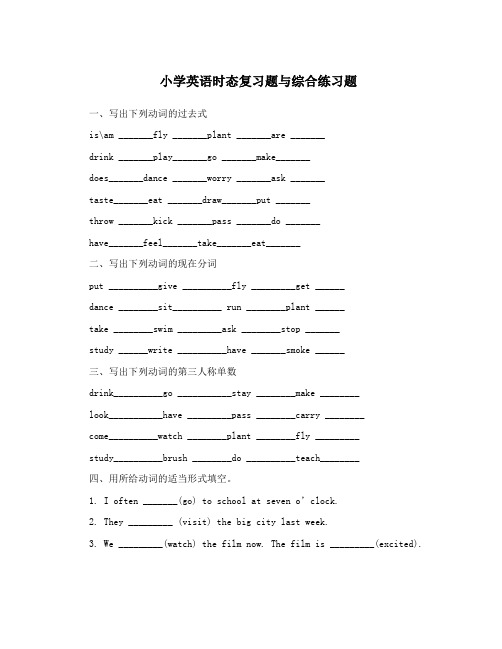
小学英语时态复习题与综合练习题一、写出下列动词的过去式is\am _______fly _______plant _______are _______drink _______play_______go _______make_______does_______dance _______worry _______ask _______taste_______eat _______draw_______put _______throw _______kick _______pass _______do _______have_______feel_______take_______eat_______二、写出下列动词的现在分词put __________give __________fly _________get ______dance ________sit__________ run ________plant ______take ________swim _________ask ________stop _______study ______write __________have _______smoke ______三、写出下列动词的第三人称单数drink__________go ___________stay ________make ________look___________have _________pass ________carry ________come__________watch ________plant ________fly _________study__________brush ________do __________teach________四、用所给动词的适当形式填空。
1. I often _______(go) to school at seven o’clock.2. They _________ (visit) the big city last week.3. We _________(watch) the film now. The film is _________(excited).4. The girl _____________(sing) in the classroom now. She likes_______________(sing) very much.5. Mike __________(go) to school on foot every day. But today he___________(go) there by car.6. Miss Li _________(wash) her hands just now. But she_________(teach) the students in class now.7. The students ________(milk) cows and _________(pick) oranges on the farm on Sunday.8. Bill ________(live) in Shanghai last month.9. My uncle ________ (collect) eggs every day.10. I _________(do) my homework last night.11. Last Sunday we ___________(park) our car in the park.12. Su Yang often ___________(water) flowers in the evening.13. I ________(cook) nice food yesterday.14. There __________(be) a football game in our school just now.15. Su Yang and Su Hai ________ (be) in the classroom just now.16. Liu Tao ________ (milk) cows on the farm two days ago.小学英语所有时态综合练习一、用动词的正确形式填空1. I ________ (do) my homework every evening.2. We _______ (fly) kites in the park on Sundays.3. My mother ________ (clean) our room on Sundays.4. Tom _______(play) the piano every Saturday. Now he______ (play).5. She _______(like) swimming. She ______ (swim) this weekend.6.Usually my mother _______ (wash) the dishes after lunch. But mygrandma_______ (wash) today.7. Look at the man! He ______ (read) a magazine.8. Look! The plane ________ (fly) over the building.9. Listen! My aunt ______ (sing) in the room.She is a singer. She_____ (like) singing. She ______(have) a music show. She is excited. 10. Tom and Mike always ______ (swim) in the river. They _____ (swim) in the swimming pool this Sunday. Look! They ______ (swim).11. What ______ you usually ______ (do) in the evening? I _______ (play) computer games.12. What _______ you _______ (do) now? I _______ (make) a paper plane.13. What _______ he _______ (do)? He ______ (dance).14. What _______ she ______ (do) yesterday? She ______ (visit) her grandparents.15. ______ your mother ______ (read) newspaper in the morning? Yes, She ________ .16. _______ you _______ (like) fishing?No, I ______ . I like ______ (swim),but my brother ______ (like). 17. How ______ your father _______ (go) to work every day? He ______ (go) by bike. But it’s cold today. He ______ (take) the No.21 bus,, and he _______ (go) to work by taxi yesterday.18. _______ the monkey _______ (like) climbing trees? Yes, it_______ . 19. What _______ your father ______ (do) after lunch? He_______ (read) a comic book. What _____ he _______(do) today? He _______ (clean) the kitchen for my grandma. Look! He _______(clean).20. ________ you ______ (collect) stamps? Yes. I _______ . ________ your brother ______ (collect), too? No, he ________ .二、选择题1. _____ he _____ to the park at 6:30 in the morning? No,he _____ .A. Does; goes; doesB. Does; go; doesn’tC. Does; go; does2. What colour _____ you _____ this bookcase? I _____ it pink. A. are; going to paint; am going to paint B. do; paint; paint C. did; paint; painted3. Tim always _____ a picture at home. He _____ a car now.A. draws; is drawingB. draw; drawC. draws; draw4. She usually _____ her friends. They often _____ tea. A. see;drink B. sees; drinks C. sees; drink5. He usually ____the dishes at night, but tonight he ___ clothes. A. wash; wash B.washes; is going to wash C. is washing; washes6. Mr. Green usually ___his newspaper in the evening, but he and his wife____television yesterday evening.A.reads; watchesB.reads; is going to watchC.reads; watched 7.Where are the man and the woman? They _____ near the tree.A. sitB. satC. are sitting8. _____ your penpal _____ diving? No, he _____ .He ______ writing stories. A. Does; like; doesn’t; likes B. Does; likes; doesn’t; like C. Do; like;don’t; likes9. ___ you ____fishing yesterday? No, we ___ .A. Does; go; doesn’tB. Did; go; didn’tC. Do; go; don’t10. Open the window, Please. Look! He _____ it.A. opensB. is openningC. is opening11. I usually _____ some milk every day. But I _____ coffee yesterday.A. drink; drankB. is drinking; drinkC. drank; am drinking 12. Mr. Green often _____ his newspapers at night. But he _____ an interesting book tonight.A. reads; readsB. reads; readC. reads; is going to read13. The old man _____ playing sports in the park. He _____ morning exercise now.A. likes; is doingB. likes; doesC. like; doing 14. What _____ you usually _____ in the evening? I ______ computer games. What _____ you _____ last night? I _____ a book.A. do; do; playB. did; do; playedC. does; do; playsdid; do; read do; do; read do; do; am reading 15. Where ______ the boy _____ ? He _____ across the river now.A. does; swim; swimsB. is; swimming; is swimming D. is; swimming; isswimming16. _____ you ____ to music now? Yes, we _____ .A. Do; listen; doB. Did; listen; didC. Are; listening; are 17. Put on you coat, please. OK. I ______ it on.A. am puttingB. am going to putC. put18. ____ you _____coffee? Yes, I ____ .A. Do; like; doB. Did; like; didC. Are; like; am 19. Look! Two cats ______ across the wall.A. runB. runsC. are running 20. She _____ tea, but he _____ .A. li kes; doesn’t B; like; don’t C. like; doesn’t21. Jane _____ some washing this time yesterday.A. is doingB. had doneC. was doingD. did22. According to the time table, the train for London ___ at seveno'clock in the evening.A. was leavingB. has leftC. leavesD. will leave23. You should visit this part of the country when ___.A. spring will comB. spring comesC. It has been springD. It will be spring24. You needn't hurry her. She ___ it by the time you are ready.A. will have been finishingB. Would finishC. Will have finishedD. Willbe finishing25. We can go home when the ground ___A. is dryingB. has driedC. driedD. will dry26. Obviously, he ___ a bad cold. He sneezes so often.A. hasB. has beenC. hadD. was27. Darwin proved that natural selection ___the chief factor in the development of species.A. has beenB. had beenC. isD. was28. While Peggy ___, her brother is playing records.A. readsB. is readingC. has read D has been reading29. It's been a long time since I ___. How are you?A. had last seen youB. saw you lastC. have least seen youD. last was seeing you30. We ___ on it for several hours but we have not yet reached any conclusion.A. workB. are workingC. have been workingD. have been worked31. He said that he ___ for Shanghai the next day.A. will leaveB. has leftC. would leaveD. had left 32. This is the first time I ___ this kind of refrigerator.A. sawB. have seenC. am seeingD. see33. "As soon as I ___ home, I'll have a hot bath." He promised himself.A. gotB. will getC. have gotD. am getting34. —_____ my glasses? —Yes, I saw them on your desk a minute ago.A. Do you seeB. Have you seenC. Had you seenD. Would you see35. —Who is Clarke? —_____ him yet? I saw you shaking hands with himat the meeting.A. Haven’t you metB. Hadn’t you metC. Didn’t you meetD. Don’t you meet36. I think this time yesterday he ___ an English class in No. Three Classroom BuildingA. hadB. will haveC. was havingD. would have37. By 2000, the university ___ 20,000 postgraduates.A. will be trainedB. trainsC. will have trainedD. would have 38.I will ask her for the book now, for she ____ plenty of time to read since Ilent it to her.A. hasB. has hadC. had hadD. was having39. Our football team _____ every match so far this year, but westill have three more games to play.A. winsB. was winningC. had wonD. has won40. —Who sings best in your class? —Mary _____.A. isB. doesC. doD. sing41. She _____ her pen in her room now.A. findsB. is findingC. looks forD. is looking for 42. I first met Lisa three years ago. She _____ at a radio shop at that time.A. has workedB. was workingC. had been workingD. had worked 43. What _____ you _____ tomorrow morning?A. are/going to doB. are/doingC. are/doneD. have/done 44. I _____ as soon as you come back.A. wentB. have goneC. am goingD. shall go45. The scientist _____ Canada and he will give us a talk when he_____ back.A. has gone to/comesB. has been to/will comeC. has gone to/will comeD. has been to/comes46. He found his book this morning, but now he _____ his pen.A. losesB. is missingC. has lostD. lost47. She ____ to her hometown several times.A. has beenB. has goneC. wentD. is going48. It _____ Jane and Mary who helped me the other day.A. isB. wasC. areD. were49. I _____ to bed when the telephone rang.A. have beenB. wentC. am goingD. was going 50. Mary is good at ________.A. drawing and dancingB. drawing and danceC. draw and dancing。
牛津译林版 六年级上册 时态专项练习四份 (含答案)
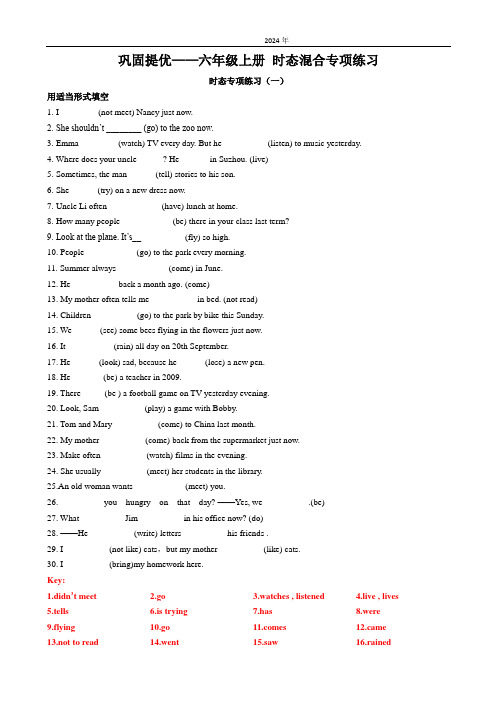
巩固提优——六年级上册时态混合专项练习时态专项练习(一)用适当形式填空1. I ________ (not meet) Nancy just now.2. She shouldn’t ________ (go) to the zoo now.3. Emma ________ (watch) TV every day. But he__________ (listen) to music yesterday.4. Where does your uncle______? He ______ in Suzhou. (live)5. Sometimes, the man ______(tell) stories to his son.6. She ______(try) on a new dress now.7. Uncle Li often____________ (have) lunch at home.8. How many people____________(be) there in your class last term?9. Look at the plane. It’s____________(fly) so high.10. People____________(go) to the park every morning.11. Summer always____________(come) in June.12. He __________ back a month ago. (come)13. My mother often tells me __________ in bed. (not read)14. Children__________ (go) to the park by bike this Sunday.15. We ______(see) some bees flying in the flowers just now.16. It __________ (rain) all day on 20th September.17. He ______(look) sad, because he ______(lose) a new pen.18. He _______(be) a teacher in 2009.19. There _____(be ) a football game on TV yesterday evening.20. Look, Sam__________ (play) a game with Bobby.21. Tom and Mary__________ (come) to China last month.22. My mother__________ (come) back from the supermarket just now.23. Make often__________ (watch) films in the evening.24. She usually__________ (meet) her students in the library.25.An old woman wants____________(meet) you.26.__________ you hungry on that day? ——Yes, we__________ .(be)27. What__________ Jim__________ in his office now? (do)28. ——He__________ (write) letters__________ his friends .29. I__________ (not like) cats,but my mother__________ (like) cats.30. I__________ (bring)my homework here.Key:1.didn’t meet2.go3.watches , listened4.live , lives5.tells6.is trying7.has8.were9.flying 10.go es 12.came 13.not to read 14.went 15.saw 16.rained17.looks , lost 18.was 19.was 20.is playing21.came 22.came 23.watches 24.meets25.to meet 26.Were , were 27.is , doing 28.wrote , to29.don’t like , likes 30.brought六年级时态专项练习(二)用适当形式填空1. I ________ (do) my homework every evening.2. We _______ (fly) kites in the park on Sundays.3. My mother ________ (clean) our room on Sundays.4. Tom _______(play) the piano every Saturday. Now he (play).5. She _______(like) swimming. She ______ (swim) three times a week.6. Usually my mother _______ (wash) the dishes after lunch. But my grandma_______ (wash) today.7. Look at the man! He____________(read) a magazine.8. Look! The plane____________(fly) over the building.9. Listen! My aunt____________(sing) in the room.She is a singer. She____________(like) singing. She _______(have) a music show. She is excited.10. Tom and Mike always ______ (swim) in the river. They _____ (swim) in the swimming pool last Sunday. Look! They____________ (swim).11. What ______ you usually (do) in the evening?I _______ (play) computer games.12. What _______ you _______ (do) now?I _______ (make) a paper plane.13. What _______ he _______ (do)?He (dance).14. What _______ she ______ (do) yesterday?She ______ (visit) her grandparents.15. ______ your mother ______ (read) newspaper in the morning?Yes, She ________ .16. _______ you _______ (like) fishing?No, I ______ . I like ______ (swim),but my brother ______ (like).17. How ______ your father _______ (go) to work every day?He ______ (go) by bike. But it’s cold today. He ______ (take) the No.21 bus, and he _______ (go) to work by taxi yesterday.18. _______ the monkey _______ (like) climbing trees? Yes, it _______ .19. What _______ your father ______ (do) after lunch? He _______ (read) a comic book. What _____ he _______(do) today? He _______ (clean) the kitchen for my grandma. Look! He (clean).20. ________ you ______ (collect) stamps? Yes. I _______ .________ your brother ______ (collect), too? No, he ________ .Key:1.do2.fly3.cleans4.plays;is playing5.likes, swims6.washes, washed7.is reading8.is flying11.do, do, play 12.are, doing, am making 9.is singing, likes, has 10.swim, swam, areswimming13.is, doing, is dancing 14.did, do, visited 15.Did,read, did 16.Do,like,don't,swimming,doesn't like17.does, go, goes, took, went 18.Does, like, does 19.does, do reads, did, do, cleaned, is cleaning 20. Do, collect, do, Does,collect, doesn't六年级时态专项练习(三)选择()1. _____ he _____ to the park at 6:30 in the morning? No,he _____ .A. Does; goes; doesB. Does; go; doesn’tC. Does; go; does()2. Tim always _____ a picture at home. He _____ a car now.A. draws; is drawingB. draw; drawC. draws; draw()3. She usually _____ her friends. They often _____ tea.A. see; drinkB. sees; drinksC. sees; drink()4. Where are the man and the woman? They _____ near the tree.A. sitB. satC. are sitting()5. _____ your penfriend _____ diving? No, he _____ .He ______ writing stories.A. Does; like; doesn’t; likesB. Does; likes; doesn’t; likeC. Do; like; don’t; likes()6. _____ you _____ fishing yesterday? No, we _____ .A. Does; go; doesn’tB. Did; go; didn’tC. Do; go; don’t()7. Open the window, Please. Look! He _____ it.A. opensB. is openningC. is opening()8. I usually _____ some milk every day. But I _____ coffee yesterday.A. drink; drankB. is drinking; drinkC. drank; am drinking()9. The old man _____ playing sports in the park. He _____ morning exercise now.A. likes; is doingB. likes; doesC. like; doing()10. What _____ you usually _____ in the evening? I ______ computer games.What _____ you _____ last night? I _____ a book.A. do; do; playB. did; do; playedC. does; do; playsdid; do; read do; do; read do; do; am reading()11. Where ______ the boy _____ ? He _____ across the river now.A. does; swim; swimsB. is; swimming; is swimmingC. is; swimming; is swimming()12. _____ you _____ to music now? Yes, we _____ .A. Do; listen; doB. Did; listen; didC. Are; listening; are ()13. Put on you coat, please. OK. I ______ it on.A. am puttingB. am going to putC. put()14. _____ you ______ coffee? Yes, I ______ .A. Do; like; doB. Did; like; didC. Are; like; am()15. Look! Two cats ______ across the wall.A. runB. runsC. are running()16. She _____ tea, but he _____ .A. likes; doesn’t B; like; don’t C. l ike; doesn’tKey: BACCA BCAAA BCBAC A六年级时态专项练习(四)一、写出下列动词的第三人称单数drink ________ go _______ stay ________ make ________ look _________have_______pass_______carry ____come________watch______plant_______fly ________study_______brush________do_________teach_______二、写出下列动词的现在分词play________ run__________ swim _________ make__________ go_________ like________ write________ski___________read________have_________sing________dance_________put_________see________buy _________love____________live_______take_________come ________get_________stop_________sit ________begin________shop___________三、写出下列动词的过去式is\am_________ fly_______ plant________ are ________ drink_________ play_______go________make ________do_________dance________worry________ask _____taste_________eat__________draw________put ______throw________kick_________pass_______do ________四、用行为动词的适当形式填空1. He _________ (live) in Wuxi two years ago.2. The cat ________ (eat) a bird last night.3. We _______ (have) a party last Halloween.4. Nancy ________ (pick) up oranges on the farm last week.5. I ________ (make) a model ship with Mike yesterday.6. They ________ (play) chess in the classroom last PE lesson.7. My mother _______ (cook) a nice food last Spring Festival.8. The girls ________ (sing) and _______ (dance) at the party.9. She and I ________(take) a walk together every evening.10. There ________(be) some water in the bottle.11. Today is a sunny day. We ___________________ (have) a picnic this afternoon.12. My brother _______________ (go) to Shanghai next week.13. Tom often ___________(go) to school on foot. But today is rain. He ___________ (go) to school by bike.14. What do you usually do at weekends? I usually __________ (watch) TV and ____________(catch) insects?15. It’s Friday today. What _____she _________ (do) this weekend? She ______________ (watch) TV and _____________ (catch) insects.16. She _______(go) to school from Monday to Friday.17. Liu Tao _______(do) not like PE.18. The child often _______(watch) TV in the evening.19. Su Hai and Su Yang _______(have) eight lessons this term.20. -What day _______(be) it today? -It’s Saturday.21.The boy __________________ ( draw)a picture now.22. Listen .Some girls _______________ ( sing)in the classroom .23. My mother _________________ ( cook )some nice food now.24. What _____ you ______ ( do ) now?25. Look . They _______________( have) an English lesson .26.They ____________(not ,water) the flowers now.27.Look! the girls ________________(dance )in the classroom .28.What is our granddaughter doing? She _________(listen ) to music.29. It’s 5 o’clock now. We _____________(have)supper now30.______Helen____________(wash )clothes? Yes ,she is .31. It _____ (be) the 2nd of November yesterday. Mr White ________ (go) to his office by car.32. Gao Shan ________ (put) the book on his head a moment ago.33. Don’t ______ the house. Mum _______ it yesterday. (clean)34. What ____ you ______ just now? I _______ some housework. (do)35. They _________ (make) a kite a week ago.36. I want to ______ apples. But my dad _______ all of them last month. (pick)37. _______ he ______ the flowers this morning? Yes, he _____. (water)38. She ____ (be) a pretty girl. Look, she _____ (do) Chinese dances.39. The students often _________ (draw) some pictures in the art room.40.What ______ Mike do on the farm? He ________ cows. (milk)五、用动词的适当形式填空1. I ______ (watch) a cartoon on Saturday.2. Her father _______ (read) a newspaper last night.3. We _________ to zoo yesterday, we _____ to the park. (go)4. ______ you _______ (visit) your relatives last Spring Festival?5. ______ he _______ (fly) a kite on Sunday? Yes, he ______.6. Gao Shan _______ (pull) up carrots last National Day holiday.7. I ____________ (sweep) the floor yesterday, but my mother ______.8. What ______ she _______ (find) in the garden last morning? She __________ (find) a beautiful butterfly.六、句型转换1. Su Hai took some photos at the Sports day.否定句:________________________________________________一般疑问句:____________________________________________肯、否定回答:__________________________________________2. Nancy went to school early.否定句:________________________________________________一般疑问句:____________________________________________肯、否定回答:__________________________________________3.He is playing the football in the playground .(对划线部分进行提问)_________________________________________________________________4.Tom is reading books in his study . (对划线部分进行提问)_________________________________________________________________5. It was exciting.否定句:________________________________________________一般疑问句:____________________________________________肯、否定回答:__________________________________________七、按照要求改写句子1. Daniel watches TV every evening.(改为否定句)___________________________________________________2. I do my homework every day.(改为一般疑问句,作否定回答)____________________________________________________________________________________3. She likes milk.(改为一般疑问句,作肯定回答)___________________________________________________________________________________4. Amy likes playing computer games.(改为一般疑问句,作否定回答)____________________________________________________________________________________________5. We go to school every morning.(改为否定句)_______________________________________________________6. He speaks English very well.(改为否定句)___________________________________________________7. I like taking photos in the park.(对划线部分提问)________________________________________________________8. John comes from Canada.(对划线部分提问)___________________________________________________9. She is always a good student.(改为一般疑问句,作否定回答)________________________________________________________________________________________10. Simon and Daniel like going skating.(改为否定句)___________________________________________________八、改错(划出错误的地方,将正确的写在横线上)1. Is your brother speak English? __________________2. Does he likes going fishing? __________________3. He likes play games after class. __________________4. Mr. Wu teachs us English. __________________5. She don’t do her homework on Sundays. _________________九、填空1. 我打算明天和朋友去野炊。
牛津上海版(三起)英语六年级下册 时态综合练习(试题)
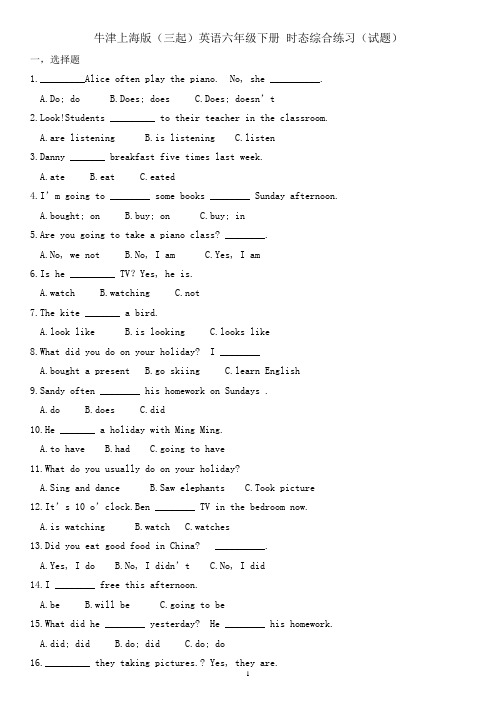
牛津上海版(三起)英语六年级下册时态综合练习(试题)一,选择题1._________Alice often play the piano. No, she __________.A.Do; doB.Does; doesC.Does; doesn’t2.Look!Students _________ to their teacher in the classroom.A.are listeningB.is listeningC.listen3.Danny _______ breakfast five times last week.A.ateB.eatC.eated4.I’m going to ________ some books ________ Sunday afternoon.A.bought; onB.buy; onC.buy; in5.Are you going to take a piano class? ________.A.No, we notB.No, I amC.Yes, I am6.Is he _________ TV?Yes, he is.A.watchB.watchingC.not7.The kite _______ a bird.A.look likeB.is lookingC.looks like8.What did you do on your holiday? I ________A.bought a presentB.go skiingC.learn English9.Sandy often ________ his homework on Sundays .A.doB.doesC.did10.He _______ a holiday with Ming Ming.A.to haveB.hadC.going to have11.What do you usually do on your holiday?A.Sing and danceB.Saw elephantsC.Took picture12.It’s 10 o’clock.Ben ________ TV in the bedroom now.A.is watchingB.watchC.watches13.Did you eat good food in China? __________.A.Yes, I doB.No, I didn’tC.No, I did14.I ________ free this afternoon.A.beB.will beC.going to be15.What did he ________ yesterday? He ________ his homework.A.did; didB.do; didC.do; do16._________ they taking pictures.? Yes, they are.A.AmB.BeC.Are17.They will ________ roast ducks in Beijing.A.ateB.eatsC.eatst summer.I ________ in the lake and played on the beach.A.swimB.swamC.will swim19.We played basketball ________.A.tomorrowB.on Saturdaysst Saturday20.________ your e-friend _______ in Beijing?A.Do; liveB.Do; livesC.Does; live21.They are singing and ________ together at the party now.A.danceB.dancedC.dancing22.Tom and Mike _______ very excited, they will take a trip.A.isB.areC.am23.I’m going to_______ homework tomorrow.A.doesB.doC.did24.I _______ a lot from our textbook.A.learnedB.learnesC.learning25.We _______ to the zoo and ______ a lot of animals yesterday.A.go; seeB.went; sawC.goes; sees26.Look! The kite _________ in the sky.A.flyB.fliesC.is flying27.He always _________ football games.A.watchesB.watchC.doesn’t28.Yesterday my presents and I ________ our house.A.were cleaningB.cleanedC.are going to clean29.---When _______ he get home on Friday? ----He gets home at four on Friday.A.doB.doesC.did30.Summer _________ spring.es afteres ines before31.What did you do last weekend ? --I _________A.read a bookB.wash the clothesC.go fishing32.I _______ presents for my parents yesterday.A.buyedB.boughtC.buying33.__________ his brothers going to climb mountains?A.IsB.AreC.Amst Sunday_______ Tree Planting Day.A.isB.wereC.was二、用所给词的正确形式填空1.-What__________Su Hai__________last Sunday? (do) -She_________(go) for a walk.2.-Did you go__________(swim) last Saturday? -No.We_________(watch) a film.3.-What__________Wang Bing usually__________after school? (do)-He usually_________(go) home and__________(teach) his little brother.4.-________(be) Miss Li in the teachers’ office now? -No.She’s_________(take) photos.5.My sister______to the supermarket every day.She _____ to the supermarket yesterday.And tomorrow she is ________to the supermarket with me again.(go)6.The Greens often ________(have) a chat with me after supper.7.My sister __________(be) a nurse next month.8.-What ___________ you _________ (do) just now? -I ________(go) for a walk.9.I__________(make) a cake yesterday.She__________(fly) a kite last Sunday.10.My rubber____________in the desk just now, but it_________in my pocket now.(be)11.Yesterday_____(be) my birthday,we_______(have) a birthday party in my home, I______(get) many presents from my friends.12.I ________ (do) my homework every evening.13.We _______ (fly) kites in the park on Sundays.14.______ your mother ______ (read) newspaper in the morning? Yes, She ________ .15.Tom _______(play) the piano every Saturday. Now he______________(play).16.She _______(like) swimming.She ___________ (swim) next Monday.ually my mother _______ (wash)the dishes after lunch.But my grandma_________(wash) now.18.Look at the man! He ______________ (read) a magazine.19.Look! The plane ________ (fly) over the building.20.Listen! My aunt ________ (sing) in the room.She is a singer.She _____ (like) singing.She _______(have) a music show.She is excited.21.Tom and Mike always ______ (swim) in the river.They _____ (swim) in the swimming pool this Sunday.Look! They ______ (swim).22.What ______ you usually ______ (do) in the evening? I _______ (play) computer games.23.What _______ you _______ (do) now? I _______ (make) a paper plane.24.What _______ he _______ (do) tomorrow? He ______ (dance).25.What _______ she ______ (do) yesterday? She ______ (visit) her grandparents.26.How ______ your father _______ (go) to work every day?He ______ (go) by bike.But it’s cold today.He ______ (take) the No.21 bus, and he _______ (go) to work by taxi yesterday.四、句型转换1.I went to school by bus yesterday.一般疑问句:_____________________________________否定句:______________________________________2.He will go for a walk tomorrow.一般疑问句:_____________________________________否定句:______________________________________3.Lily is going to a farm with her parents next Sunday..一般疑问句:_____________________________________否定句:______________________________________对划线部分提问:______________________________________4.What are you going to do tomorrow? (根据括号提示回答)______________________________________________(have a picnic)7.I had breakfast at a quarter past seven this morning.(对划线部分提问)______________________________________________8.They will buy a blanket.一般疑问句:_____________________________________否定句:______________________________________9.I’m having an English lesson.(对划线部分提问)________________________________________________10.Joe’s father read a book yesterday.一般疑问句:_____________________________________否定句:______________________________________对划线部分提问:______________________________________。
牛津上海版英语六年级第一学期——时态讲解及巩固练习(有答案)
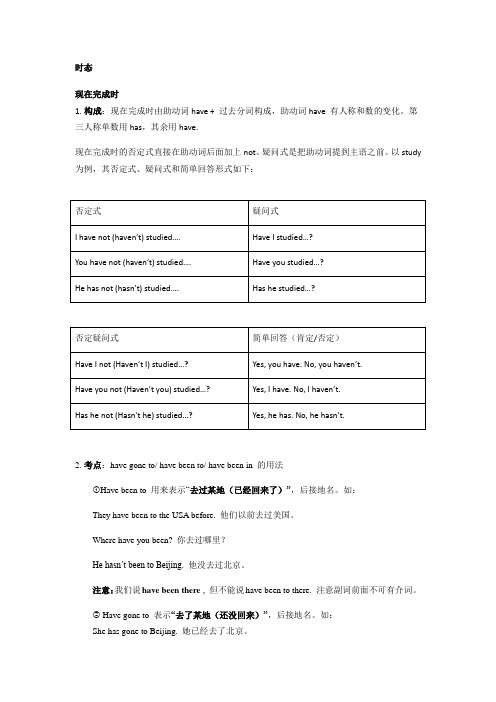
时态现在完成时1.构成:现在完成时由助动词have + 过去分词构成,助动词have 有人称和数的变化。
第三人称单数用has,其余用have.现在完成时的否定式直接在助动词后面加上not、疑问式是把助动词提到主语之前。
以study 为例,其否定式、疑问式和简单回答形式如下:2.考点:have gone to/ have been to/ have been in 的用法①Have been to 用来表示“去过某地(已经回来了)”,后接地名。
如:They have been to the USA before. 他们以前去过美国。
Where have you been? 你去过哪里?He hasn’t been to Beijing. 他没去过北京。
注意:我们说have been there , 但不能说have been to there. 注意副词前面不可有介词。
② Have gone to 表示“去了某地(还没回来)”,后接地名。
如:She has gone to Beijing. 她已经去了北京。
③ Have been in 表示“呆在某地”。
She has been in Beijing for 3 years. 她呆在北京三年了。
3.重点:现在完成时的句子中,常常用到副词①already : 表示动作发生于现在之前,距离现在时间较长,位于句中。
He went to the USA two years ago and came back a year ago. 他两年前去了美国,一年前回来了。
②just: 表示动作发生于现在之前,但距离现在时间较短,位于句中Susan went to the UK two years ago and came back yesterday. Susan has just been to the UK.苏珊两周前去了英国,昨天回来。
苏珊刚刚去英国。
③yet: 表示现在之前动作没有发生,但将来有可能发生。
小学英语时态专项练习及答案
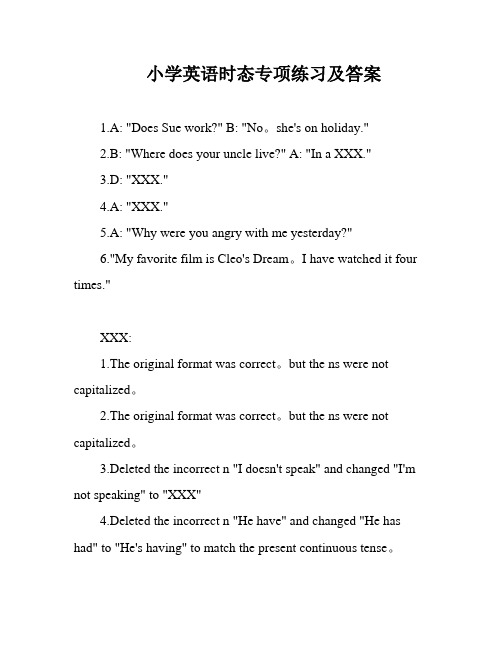
小学英语时态专项练习及答案1.A: "Does Sue work?" B: "No。
she's on holiday."2.B: "Where does your uncle live?" A: "In a XXX."3.D: "XXX."4.A: "XXX."5.A: "Why were you angry with me yesterday?"6."My favorite film is Cleo's Dream。
I have watched it four times."XXX:1.The original format was correct。
but the ns were not capitalized。
2.The original format was correct。
but the ns were not capitalized。
3.Deleted the incorrect n "I doesn't speak" and changed "I'm not speaking" to "XXX"4.Deleted the incorrect n "He have" and changed "He has had" to "He's having" to match the present continuous tense。
5.Changed "was you" to "were you" to match subject-verb agreement。
(完整版)小学英语时态练习及试题
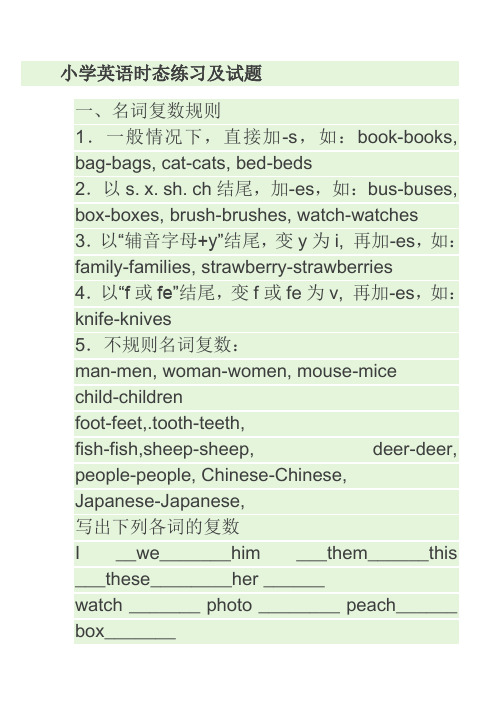
小学英语时态练习及试题一、名词复数规则1.一般情况下,直接加-s,如:book-books, bag-bags, cat-cats, bed-beds2.以s. x. sh. ch结尾,加-es,如:bus-buses, box-boxes, brush-brushes, watch-watches 3.以“辅音字母+y”结尾,变y为i, 再加-es,如:family-families, strawberry-strawberries4.以“f或fe”结尾,变f或fe为v, 再加-es,如:knife-knives5.不规则名词复数:man-men, woman-women, mouse-micechild-childrenfoot-feet,.tooth-teeth,fish-fish,sheep-sheep, deer-deer, people-people, Chinese-Chinese,Japanese-Japanese,写出下列各词的复数I __we_______him ___them______this ___these________her ______watch _______ photo ________ peach______ box_______day________ book_______ dress ________ strawberry _____man______ woman_______ child _______ sheep ______ foot________ tooth_______ 二、一般现在时一般现在时基本用法介绍【No. 1】一般现在时的功能1.表示事物或人物的特征、状态。
如:The sky is blue.天空是蓝色的。
2.表示经常性或习惯性的动作。
如:I get up at six every day.我每天六点起床。
3.表示客观现实。
如:The earth goes around the sun.地球绕着太阳转。
牛津上海版7A 八大时态专项讲解及练习
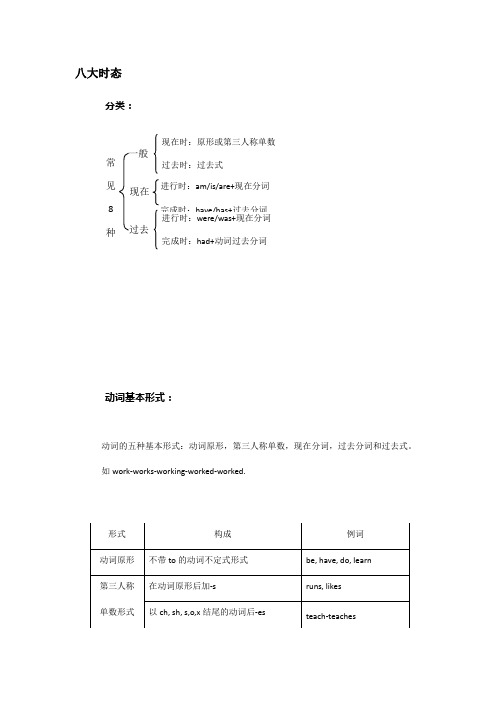
一般现在时:原形或第三人称单数过去时:过去式现在进行时:am/is/are+现在分词 完成时:have/has+过去分词 过去进行时:were/was+现在分词完成时:had+动词过去分词常 见 8 种八大时态分类:动词基本形式:动词的五种基本形式:动词原形,第三人称单数,现在分词,过去分词和过去式。
如work-works-working-worked-worked.用法:一般现在时基本用法介绍概念:表示经常性或习惯性的动作,或存在的状态,还表示主语具备的性格和能力及客观真理。
例:I get up at 6:30 in the morning.She has big eyes,small mouth and long hair.用法:1.表示经常性或习惯性的动作。
如:I get up at six every day.我每天六点起床。
2.表示客观现实。
如:The earth goes around the sun.地球绕着太阳转。
3.在时间状语从句中(以when, after, before, while, until, as soon as等引导)和条件状语从句中(以if, unless引导),用一般现在时代替一般将来时,句子可以有将来时间。
如:Please ring me up as soon as you arrive in Germany.If it rains tomorrow, we will have to stay at home.4.一般现在时表将来的单词:come, go,leave,arrive等。
如:The train for Haikou leaves at 8:00 in the morning.Here comes the bus. / There goes the bell.时间状语:always,often, usually,sometimes,never,every,once a week,on Sundays,in the morning…一般过去时的用法:概念:一般过去时表示过去某个时间里发生的动作或状态;过去习惯性、经常性的动作、行为;过去主语所具备的能力和性格。
牛津版六年级下册英语专项训练--时态练习题
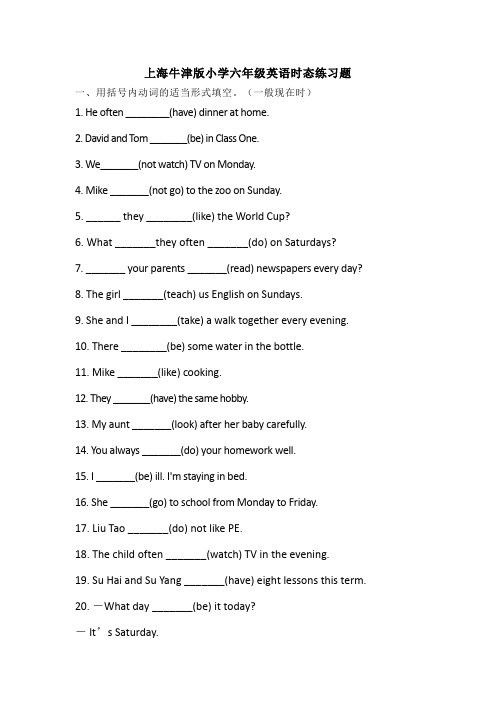
上海牛津版小学六年级英语时态练习题一、用括号内动词的适当形式填空。
(一般现在时)1.He often________(have)dinner at home.2.David and T om_______(be)in Class One.3.We_______(not watch)TV on Monday.4.Mike_______(not go)to the zoo on Sunday.5.______they________(like)the World Cup?6.What_______they often_______(do)on Saturdays?7._______your parents_______(read)newspapers every day?8.The girl_______(teach)us English on Sundays.9.She and I________(take)a walk together every evening.10.There________(be)some water in the bottle.11.Mike_______(like)cooking.12.They_______(have)the same hobby.13.My aunt_______(look)after her baby carefully.14.You always_______(do)your homework well.15.I_______(be)ill.I'm staying in bed.16. She_______(go)to school from Monday to Friday.17.Liu Tao_______(do)not like PE.18.The child often_______(watch)TV in the evening.19.Su Hai and Su Yang_______(have)eight lessons this term.20.-What day_______(be)it today?-It’s Saturday.二、用所给词的适当形式填空。
牛津版小学英语六年级过去时态练习

过去时态很简单①表示在过去某个时间发生的动作或情况。
I went to school at 7:00 yesterday morning.我昨天早晨七点去上学。
②表示在过去某个时间存在的状态。
She was not at home last night.她昨晚八点没在家。
四种时间状语①yesterday及相关短语。
例如:yesterday morning/afternoon/evening 昨天上午/下午/晚上。
②“last+ 时间状语”构成的短语。
例如:last night/month/spring/year 昨晚/上个月/去年春天/去年。
③“一段时间+ago”组成的短语。
例如:three days ago 三天以前four years ago四年以前。
④“介词+ 时间名词”组成的短语。
例如:in 1999 在1999年; on the morning of December 25th 在12月25号早上。
四种谓语动词的表现形式①be动词的过去式was、were.(was单数; were复数)例如:She was a teacher five years ago. 她五年前是一名教师。
②行为动词的过去式,分为规则动词和不规则动词两种。
(行为动词的过去式无单复数之分)规则动词的过去式的构成遵循以下四个规则:1)直接在动词后加ed,例如:help-helped; want-wanted等;1, 以不发音的字母e结尾时,去掉e加ed (即直接加d) , 例如:like-liked; use-used 等;2)以辅音字母y结尾时,把y变成i再加ed, 例如:carry-carried; study-studied 等;3)以元音字母加y结尾的,直接加ed. 例如:play-played; enjoy-enjoyed;stay-stayed 4)以重读闭音节结尾,双写最后一个辅音字母再加ed, 例如:stop-stopped;shop-shopped等。
小学英语时态练习大全(附答案)-小学英语时态专项训练及答案
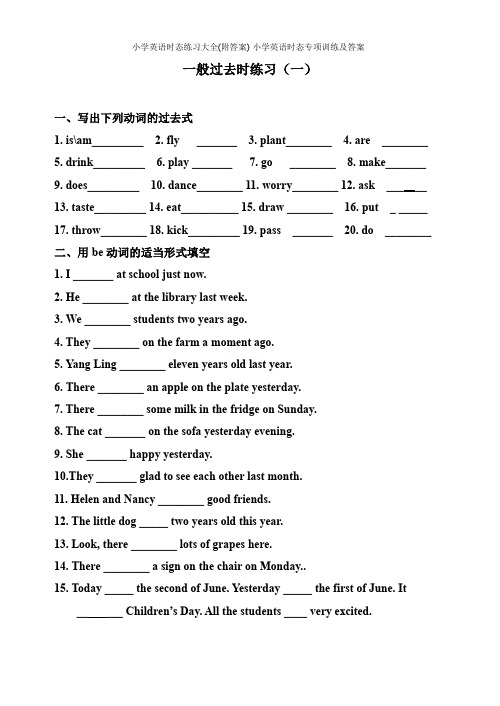
一般过去时练习(一)一、写出下列动词的过去式1. is\am_________2. fly _______3. plant________4. are ________5. drink_________6. play _______7. go ________8. make_______9. does_________ 10. dance________ 11. worry________ 12. ask ___ __ 13. taste_________ 14. eat__________ 15. draw ________ 16. put _ _____17. throw________ 18. kick_________ 19. pass _______ 20. do________二、用be动词的适当形式填空1.I _______ at school just now.2.He ________ at the library last week.3.We ________ students two years ago.4. They ________ on the farm a moment ago.5.Yang Ling ________ eleven years old last year.6.There ________ an apple on the plate yesterday.7. There ________ some milk in the fridge on Sunday.8. The cat _______ on the sofa yesterday evening.9. She _______ happy yesterday.10.They _______ glad to see each other last month.11.Helen and Nancy ________ good friends.12. The little dog _____ two years old this year.13. Look, there ________ lots of grapes here.14.There ________ a sign on the chair on Monday..15.Today _____ the second of June. Yesterday _____ the first of June. It__ ___ Children’s Day. All the students ____ very excited.三、句型转换1. It was exciting.否定句:________________________________________________一般疑问句:____________________________________________肯、否定回答:__________________________________________ 2. All the students were very excited.否定句:________________________________________________一般疑问句:____________________________________________肯、否定回答:__________________________________________ 3. They were in the school.否定句:________________________________________________一般疑问句:____________________________________________肯、否定回答:__________________________________________ 4. There was a car in front of the house just now.否定句:________________________________________________一般疑问句:____________________________________________肯、否定回答:__________________________________________四、用行为动词的适当形式填空1. He _________ (live) in Wuxi two years ago.2. The cat ________ (eat) a bird last night.3. We _______ (have) a party last Halloween.4. Nancy ________ (pick) up oranges on the farm last week.5. I ________ (make) a model ship with Mike yesterday.6. They ________ (play) chess in the classroom last PE lesson.7. My mother _______ (cook) a nice food last Spring Festival.8. The girls ________ (sing) and _______ (dance) at the party.9. I ______ (watch) a cartoon on Saturday.10. Her father _______ (read) a newspaper last night.11. We _________ to zoo yesterday, we _____ to the park. (go)12. ______ you _______ (visit) your relatives last Spring Festival?13. ______ he _______ (fly) a kite on Sunday? Y es, he ______.14. Gao Shan _______ (pull) up carrots last National Day holiday.15. I _______ (sweep) the floor yesterday, but my mother ______.16. What ______ she _______ (find) in the garden last morning?She __________ (find) a beautiful butterfly.五、句型转换1. Su Hai took some photos at the Sports day.否定句:________________________________________________一般疑问句:____________________________________________肯、否定回答:__________________________________________ 2. Nancy went to school early.否定句:________________________________________________一般疑问句:____________________________________________肯、否定回答:__________________________________________ 3. We sang some English songs.否定句:________________________________________________一般疑问句:____________________________________________肯、否定回答:__________________________________________ 4. The children had a good time in the park.否定句:__________________________________________一般疑问句:________________________________________对划线部分提问:____________________________________5. There were about nine hundred people at the concert.(音乐会) 否定句:__________________________________________一般疑问句:________________________________________对划线部分提问:____________________________________6. There was only one problem.否定句:__________________________________________一般疑问句:________________________________________肯定/否定回答:____________________________________7. Ann did her homework yesterday evening.否定句:__________________________________________一般疑问句:________________________________________对划线部分提问:____________________________________8. Last week I read an English book.否定句:__________________________________________一般疑问句:________________________________________肯定/否定回答:____________________________________对划线部分提问:____________________________________9. My brother was in the park just now.否定句:__________________________________________一般疑问句:________________________________________肯定/否定回答:____________________________________对划线部分提问:____________________________________10. She had some bread for lunch today.否定句:__________________________________________一般疑问句:________________________________________肯定/否定回答:____________________________________对划线部分提问:____________________________________11. They read English last night.否定句:__________________________________________一般疑问句:________________________________________肯定/否定回答:____________________________________对划线部分提问:____________________________________六、用动词的适当形式填空1. It ______ (be) Ben’s birthday last Friday.2. We all ______ (have) a good time last night.3. He ________ (jump) high on last Sports Day.4. Helen ________ (milk) a cow on Friday.5. She likes _____ newspapers, but she ______ a book yesterday. (read)6. He _______ football now, but they _______ basketball just now. (play)7. Jim’s mother _________ (plant) trees just now.8. ____ they ____ (sweep) the floor on Sunday? No, they _____.9. I _______ (watch) a cartoon on Monday.10. We ___________ (go) to school on Sunday.11. It _____ (be) the 2nd of November yesterday.12. Mr White ________ (go) to his office by car.13. Gao Shan ________ (put) the book on his head a moment ago.14. Don’t ______ the house. Mum _______ it yesterday. (clean)15. What ____ you ______ just now? I ______ some housework. (do)16. They _________ (make) a kite a week ago.17. I want to ______ apples. But my dad _______ all of them last month. (pick)18. ____ he ___ the flowers this morning? Yes, he _____. (water)19. She ____ (be) a pretty girl. Look, she _____ (do) Chinese dances.20. The students often _____ (draw) some pictures in the art room.21.What ______ Mike do on the farm? He ________ cows. (milk)七、写出下列动词的三单现、过去式和现在分词go ______ _______ _______ enjoy _______ _______ ________buy ______ ______ _______ eat______ _______ _______get _______ _______ _______ walk ________ _______ ________take______ ______ ______ dance_______ ________ _______write _______ ______ ______ run______ _______ _______swim_______ _______ ______find _______ _______ _______begin______ ______ ______ eat ______ _______ ______play ______ ______ _______ study ______ ______ ________八. 用所给词的适当形式填空。
小学英语四大时态总结及练习题

小学英语四大时态总结及练习题1. 简单现在时(Simple Present Tense)用法:表示现在正在进行的事情,或者经常性、习惯性的动作或状态。
构成:主语+ 动词原形+ 其他肯定句:I play basketball every day.否定句:I don't play basketball every day.一般疑问句:Do you play basketball every day?练习题:1. The sun (rise) in the east.2. We (love) our parents very much.3. (Do) you like to eat ice cream?4. Tom (not like) to go to school.5. They (visit) Beijing last year.2. 简单过去时(Simple Past Tense)用法:表示在过去某个时间点已经结束的动作或状态。
构成:主语+ 动词过去式+ 其他肯定句:I played basketball yesterday.否定句:I didn't play basketball yesterday.一般疑问句:Did you play basketball yesterday?练习题:1. Mary (go) to the park yesterday.2. We (have) a party last night.3. (Did) you see the movie yesterday?4. Lucy (not want) to go to the zoo last week.5. They (visit) their grandparents last weekend.3. 现在进行时(Present Continuous Tense)用法:表示正在进行的动作。
构成:主语+ be动词(am, is, are)+ 动词ing + 其他肯定句:I am playing basketball now.否定句:I am not playing basketball now.一般疑问句:Are you playing basketball now?练习题:1. My sister (watch) TV at the moment.2. We (not study) English now.3. (Is) he swimming in the river?4. Lucy (not listen) to music now.5. They (play) volleyball in the park.4. 将来时(Future Tense)用法:表示将要发生的动作或状态。
小学牛津英语四个时态

龙文教育学科导学案学生教师日期年级学科时段学情分析课题学习目标与考点分析学习重点难点教学方法一复习学生自己阐述四种时态的用法。
1 一般现在时。
2 现在进行时3 一般过去时4 一般将来时二练习一、写出下列动词的第三人称单数形式。
sit________ swim________ go ________make ________run ________ write________ cry________ study _________watch_______ wash_______ say________ play _________二、用do does填空1、_____ you ride a bike after school? Y es, I ________.2、______ your sister like PE? No, she ______ not.1、What_______ the students have? They have some pens.2、How______ Linda go to school? She goes to school on foot.3、He ______ not speak English. He speaks Chinese.4、______ they watch TV on Sundays? Y es, they ______ .5、My father and mother ______ not read newspapers on Saturday.三、用一般现在时填空。
1、What _____ he _____ (have)? He ______ (have) a toy plane.2、My mother ________ not________ (like) English. She _______ (like) Chinese.3、______ you ______ (go ) to school by bus? No, I _____ (go) to school by car.4、Miss Wang ______ (swim ) every day.5、I ___(like) English . T om ____ ______ _____(not like ) English.6、The moon ______ (go) around the earth.7、When_____ you ______ (go ) to school? I _____ (go) to school at five every day.四、写出下列动词的现在分词。
小学英语时态复习现在进行时专项讲解和训练
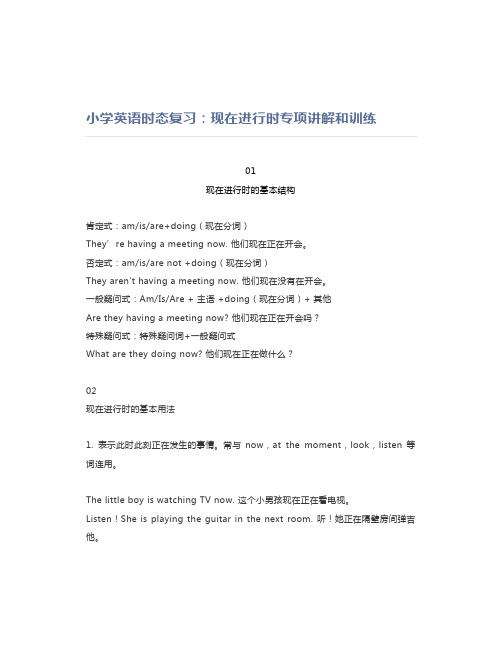
小学英语时态复习:现在进行时专项讲解和训练01现在进行时的基本结构肯定式:am/is/are+doing(现在分词)They’re having a meeting now. 他们现在正在开会。
否定式:am/is/are not +doing(现在分词)They aren't having a meeting now. 他们现在没有在开会。
一般疑问式:Am/Is/Are + 主语 +doing(现在分词)+ 其他Are they having a meeting now? 他们现在正在开会吗?特殊疑问式:特殊疑问词+一般疑问式What are they doing now? 他们现在正在做什么?02现在进行时的基本用法1. 表示此时此刻正在发生的事情。
常与now,at the moment,look,listen等词连用。
The little boy is watching TV now. 这个小男孩现在正在看电视。
Listen!She is playing the guitar in the next room. 听!她正在隔壁房间弹吉他。
2. 表示现阶段一直在进行着或是重复发生着的动作,不强调此时此刻正在做。
常与表示时间段的时间状语连用。
I am studying computer this term. 这个学期我一直在学习计算机。
3. 表示说话人褒义或贬义的情感色彩,如赞许、批评、喜欢、厌恶等。
此时常与alway、often等频度副词连用。
He is always thinking of others , not of himself. 他总是为他人着想,而不为自己。
(表示赞许)One of my roommates is often leaving things about. 我的一个室友经常乱扔东西。
(表示不满)4. 表示在近期按计划或安排要发生的动作。
(现在进行时表示一般将来的含义。
2023年牛津一般现在时态归纳整理与练习

一、概念:一般目前时:它表达1)常常性、习惯性旳动作或存在旳状态。
e.g. I go to school on foot. He is very busy now.2)表达主语旳特性、性格、能力、爱好等。
e.g. He can swim. I work hard. I like watching TV.3)表达客观真理e.g. There are seven days in a week. The moon moves round the earth.时间状语:often常常, usually一般, always总是,sometimes有时,at…在几点钟二、谓语动词:只有第三人称时,用动词单数形式,其他动词均用原形第三人称单数作主语时谓语动词变化:1、多数(即规则动词)在动词后加s。
如:rain—rains like—likes 等。
2、以s,x,sh,ch,o结尾旳动词加es。
如:go—goes wash--washes3、以辅音字母加y结尾,把y改i再加es。
如: fly—flies4. have变has.5、be动词(即系动词):第一人称用am;第三人称(he, she, it,单数可数名词,不可数名词)用is;第二人称(或第一、二、三人称复数、复数名词、复数人称)用are。
一、写出下列动词旳第三人称单数:wash___________match___________study____________go_________carry_________drink_________ stay____________make____________look____________have________come________watch_________ plant____________fly______________brush___________do_________teach_________talk__________ stop____________play______________say____________buy________worry_________like_________ take____________love_____________become_________drive________shine_________leave________ wake___________ride______________write___________give_________see__________swim________ get_____________sit_______________stand___________cut__________run__________begin_______reach____________eat_______________help___________visit__________二、用动词旳合适形式填空1. We often___________(play) in the playground.2. He _________(get) up at six o’clock.3.__________you_________(brush) your teeth every morning.4. What__________ (do) he usually__________ (do) after school?5. Danny__________ (study) English,Chinese,Maths,Science and Art an school.6. Mike sometimes __________(go) to the park with his sister.7. At eight at night, she __________(watch) TV with his parents.8. ________ Mike________(read) English every day?9.How many lessons_________your classmate________(have) on Monday?10. What time_________his mother_________(do) the housework?11. He often ________(have) dinner at home.12. Daniel and Tommy _______(be) in Class One.13. We ususlly _______(not watch) TV on Monday.14. Nick _______(not go) to the zoo on Sunday.15. ______ they ________(like) the World Cup?16. What _______they often _______(do) on Saturdays?17. _______ your parents _______(read) newspapers every day?18. The girl _______(teach) us English on Sundays.19. She and I ________(take) a walk together every evening.20. There ________(be) some water in the bottle.21. I _______(be) ill. I’m staying in bed.22. -What day _______(be) it today? -It’s Saturday.23.The tiger _______ (not come) from Africa. It _______ (be) from China.三、单项选择选1. Jenny ____ in an office. Her parents ____in a hospital.A work worksB works workC work are workingD is working work2. Wang Mei ____ music and often ____ to music.A like; listenB likes; listensC like; are listeningD liking ; listen3. Jenny____ English every evening. A has study B studies C study D studied4. The picture _______ nice. A. looks B. is looked C. look D. is looking5. John always ______ others. A. help B. helping C. helps D. to help四、按照规定改句子1. I have many books.否认句: ___________________________________________________一般疑问句: _________________________________________________________回答(肯定和否认):_____________________________________________________划线部分提问:_____________________________________________________2. She lives in a small town near New York.否认句: ___________________________________________________________________一般疑问句: ________________________________________________________________回答(肯定和否认):_________________________________________________________划线部分提问:______________________________________________________________3. Nancy runs fast否认句: _______________________________________________________________一般疑问句: ___________________________________________________________回答(肯定和否认):___________________________________________________划线部分提问:______________________________________________________4. Daniel watches TV every evening.否认句:_____________________________________________________________一般疑问句:_______________________________________________________回答(肯定和否认):_____________________________________________________特殊疑问句:_____________________________________________________________ 5. I do my homework every day.否认句:__________________________________________________________________ 一般疑问句:_______________________________________________________________ 回答(肯定和否认):______________________________________________________ 特殊疑问句:____________________________________________________________ 6. I am a teacher.否认句: _________________________________________________一般疑问句: ________________________________________________回答(肯定和否认):___________________________________________划线部分提问:________________________________________________7. She is always a good student.否认句: __________________________________________________________一般疑问句: ________________________________________________________回答(肯定和否认):________________________________________________________ 划线部分提问:____________________________________________________________ 8.Tom usually does his homework at home.否认句: _________________________________________________________一般疑问句: _______________________________________________________回答(肯定和否认):_____________________________________________________划线部分提问:__________________________________________________________(Be动词)be动词使用方法歌:我用am,你用are,is连接他,她,它。
- 1、下载文档前请自行甄别文档内容的完整性,平台不提供额外的编辑、内容补充、找答案等附加服务。
- 2、"仅部分预览"的文档,不可在线预览部分如存在完整性等问题,可反馈申请退款(可完整预览的文档不适用该条件!)。
- 3、如文档侵犯您的权益,请联系客服反馈,我们会尽快为您处理(人工客服工作时间:9:00-18:30)。
牛津小学英语时态复习及专项练习语法及练习1 be动词Be 动词的用法:(1) Am--was Is --was Are--were 口诀:我用am, 你用are, is用在他她它,复数全用are。
(2) 肯定和否定句I am (not) from London. He is(not) a teacher. She is(not) in the dining room. My hair is(not) long. Her eyes are(not) small.(3) 一般疑问句Am I a Chinese? Yes, you are. No, you aren’t. Are they American? Yes, they are. No, they aren’t. Is the cat fat? Yes, it is. No, it isn’t.用恰当的be动词填空。
1. I ______ a boy. ______ you a boy? No, I _____ not.2. The girl______ Jack's sister.3. The dog _______ tall and fat.4. The man with big eyes _______ a teacher.5. ______ your brother in the classroom?.语法及练习2 人称代词和物主代词人称代词和物主代词1.人称代词主格和宾格的区别:主格通常位于句中第一个动词之前(有时候位于than 之后),宾格一般位于动词或介词之后。
2.物主代词形容词性与名词性的区别:形容词性用时后面一般要带上名词,名词性则单独使用,后面不带名词。
一.填写代词表主格。
I it weyou themhis yourhers二.用所给词的适当形式填空。
1. That is not _________ kite. That kite is very small, but _________ is very big. ( I )2. The dress is _________. Give it to _________. ( she )3. Is this _________ watch? (you) No, it’s not _________ . ( I )4. _________ is my brother. ________ name is Jack. Look! Those stamps are _________. ( he )5. _________ dresses are red. (we) What colour are _________? ( you )6. Here are many dolls, which one is _________ ? ( she )7. I can find my toy, but where’s _________? ( you )8. Show _________ your kite, OK? (they)9. I have a beautiful cat. _________name is Mimi. These cakes are _________. ( it )语法及练习3 名词复数和动词三单一、名词复数规则1.一般情况下,直接加-s,如:book-books, bag-bags, cat-cats, bed-beds2.以s. x. sh. ch结尾,加-es,如:bus-buses, box-boxes, brush-brushes, watch-watches3.以“辅音字母+y”结尾,变y为i, 再加-es,如:family-families, strawberry-strawberries 4.以“f或fe”结尾,变f或fe为v, 再加-es,如:knife-knives5.不规则名词复数:man-men, woman-women, policeman-policemen, policewoman-policewomen, mouse-mice child-children foot-feet,.tooth-teeth fish-fish, people-people, Chinese-Chinese, Japanese-Japanese练习:写出下列各词的复数。
I _________ him _________ this _______ her ______ watch _______ book_______ child _______ photo ________ diary ______ day________ foot________ dress ________ tooth_______ sheep ______ box_______ strawberry _____ thief _______yo-yo ______ peach______ sandwich ______ man______ woman_______ paper_______ people________ 二.动词三单的变化规则1.一般情况下,直接加-s,如:cook-cooks, milk-milks2.以s. x. sh. ch. o结尾,加-es,如:guess-guesses, wash-washes, watch-watches, go-goes 3.以“辅音字母+y”结尾,变y为i, 再加-es,如:study-studies练习: 写出下列动词的第三人称单数。
drink ________ go _______ stay ________ make ________ look _________have_______ pass_______ carry ____ come________ watch______plant_______ fly ________ study_______ brush________ teach_______语法及练习4 一般现在时一般现在时一般现在时基本用法介绍一般现在时的功能1.表示事物或人物的特征、状态。
如:The sky is blue.天空是蓝色的。
2.表示经常性或习惯性的动作。
如:I get up at six every day.我每天六点起床。
3.表示客观现实。
如:The earth goes around the sun.地球绕着太阳转。
一般现在时的构成1. be动词:主语+be(am,is,are)+其它。
如:I am a boy.我是一个男孩。
2.行为动词:主语+行为动词(+其它)。
如:We study English.我们学习英语。
当主语为第三人称单数(he, she,it)时,要在动词后加"-s"或"-es"。
如:Mary likes Chinese.玛丽喜欢汉语。
一般现在时的变化1. be动词的变化。
否定句:主语+ be + not +其它。
如:He is not a worker.他不是工人。
一般疑问句:Be +主语+其它。
如:-Are you a student? -Yes. I am. / No, I'm not.特殊疑问句:疑问词+一般疑问句。
如:Where is my bike?2.行为动词的变化。
否定句:主语+ don't( doesn't ) +动词原形(+其它)。
如:I don't like bread. 当主语为第三人称单数时,要用doesn't构成否定句。
如:He doesn't often play.一般疑问句:Do( Does ) +主语+动词原形+其它。
如:- Do you often play football? - Yes, I do. / No, I don't.当主语为第三人称单数时,要用does构成一般疑问句。
如:- Does she go to work by bike? - Yes, she does. / No, she doesn't.特殊疑问句:疑问词+一般疑问句。
如:How does your father go to work?一般现在时用法专练:一、用括号内动词的适当形式填空。
1. He often ________(have) dinner at home.2. Daniel and Tommy _______(be) in Class One.3. We _______(not watch) TV on Monday.4. Nick _______(not go) to the zoo on Sunday.5. ______ they ________(like) the World Cup?6. What _______they often _______(do) on Saturdays?7. _______ your parents _______(read) newspapers every day?8. The girl _______(teach) us English on Sundays.9. She and I ________(take) a walk together every evening.10. There ________(be) some water in the bottle.语法及练习5现在进行时1.现在进行时表示现在正在进行或发生的动作,也可表示当前一段时间内的活动或现阶段正在进行的动作。
2.现在进行时的肯定句基本结构为be+动词ing.3.现在进行时的否定句在be后加not。
4.现在进行时的一般疑问句把be动词调到句首。
5.现在进行时的特殊疑问的基本结构为:疑问词不达意+ be + 主语+ 动词ing?但疑问词当主语时其结构为:疑问词不达意+ be + 动词ing?动词加ing的变化规则1.一般情况下,直接加ing,如:cook-cooking2.以不发音的e结尾,去e加ing,如:make-making, taste-tasting3.如果末尾是一个元音字母和一个辅音字母,双写末尾的辅音字母,再加ing,如:run-running, stop-stopping现在进行时专项练习:一、写出下列动词的现在分词:play________ run__________ swim _________ make__________ go_________like________ write________ ski___________ read________ have_________sing ________ dance_________ put_________ see________ buy _________love_________ live_______ take_________ come ________ get_________stop_________ sit ________ begin________ shop___________二、用所给的动词的正确形式填空:1.The boy __________________ ( draw)a picture now.2. Listen .Some girls _______________ ( sing)in the classroom .3. My mother _________________ ( cook )some nice food now.4. What _____ you ______ ( do ) now?5. Look . They _______________( have) an English lesson .6.They ____________(not ,water) the flowers now.7.Look! the girls ________________(dance )in the classroom .8.What is our granddaughter doing? She _________(listen ) to music.9. It’s 5 o’clock now. We _____________(have)supper now10.______Helen____________(wash )clothes? Yes ,she is .语法及练习6 将来时将来时一、概念:表示将要发生的动作或存在的状态及打算、计划或准备做某事。
